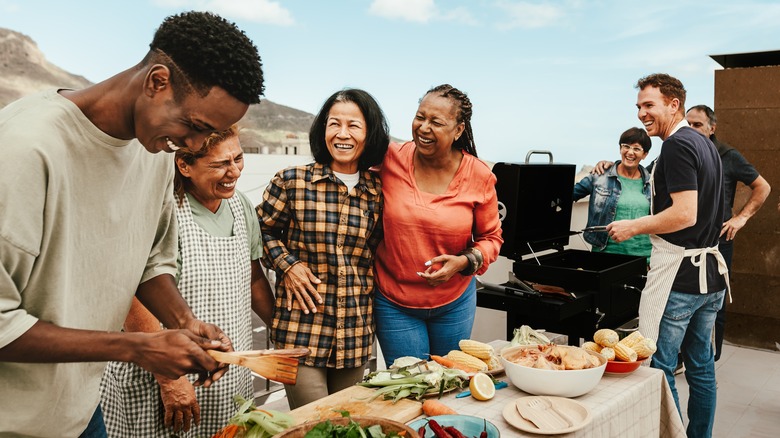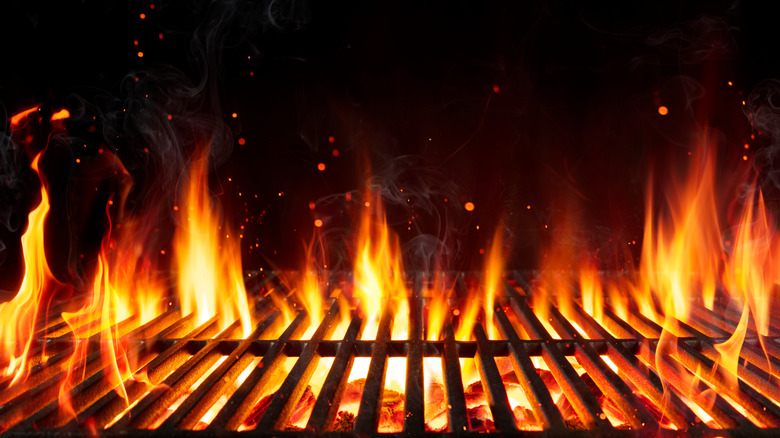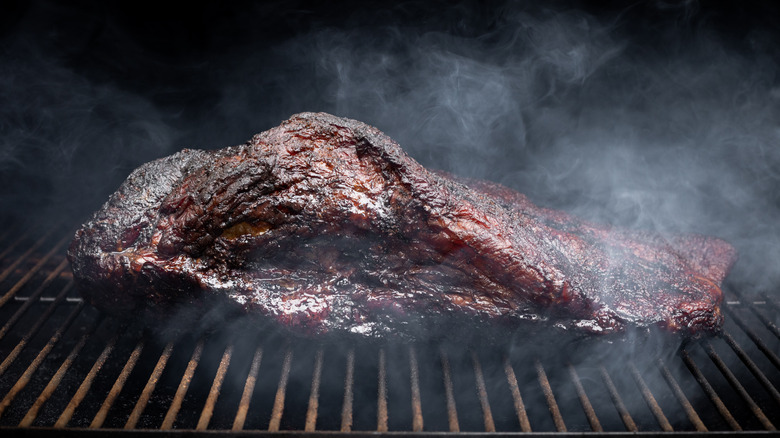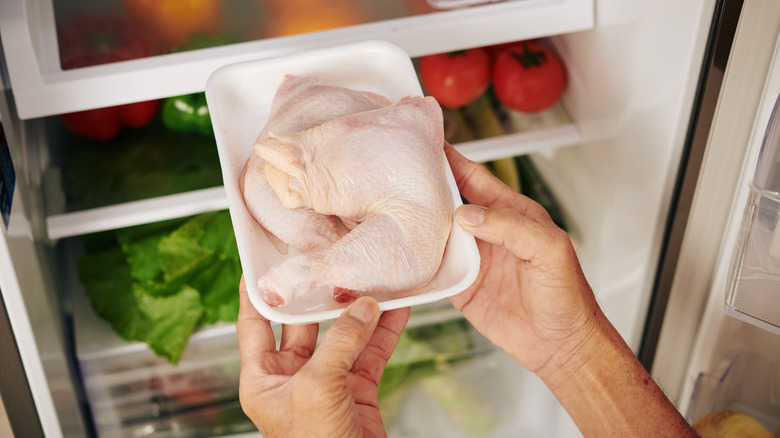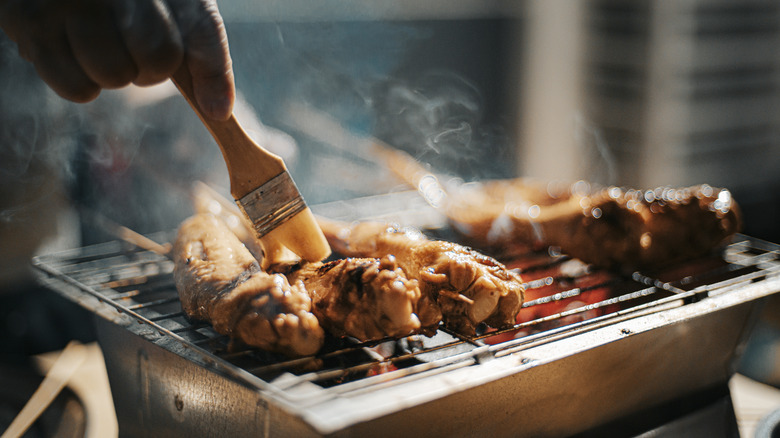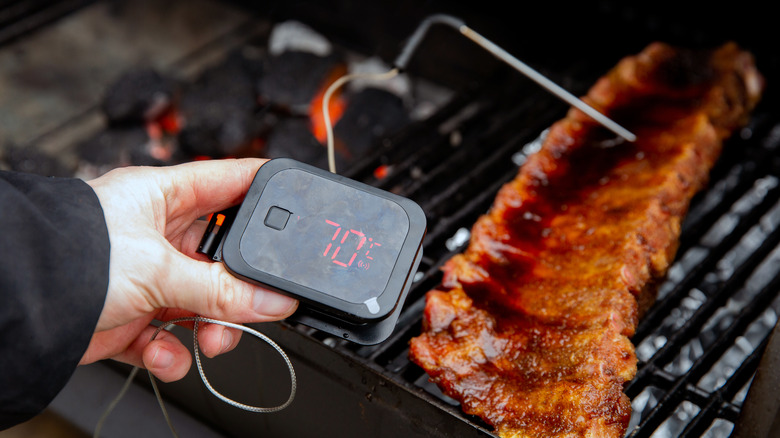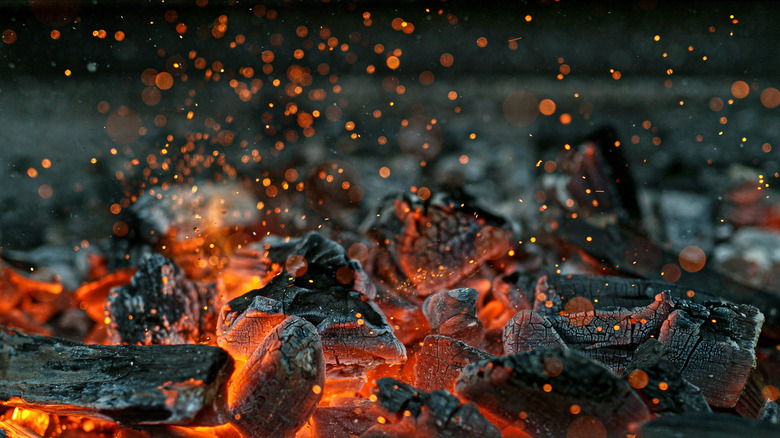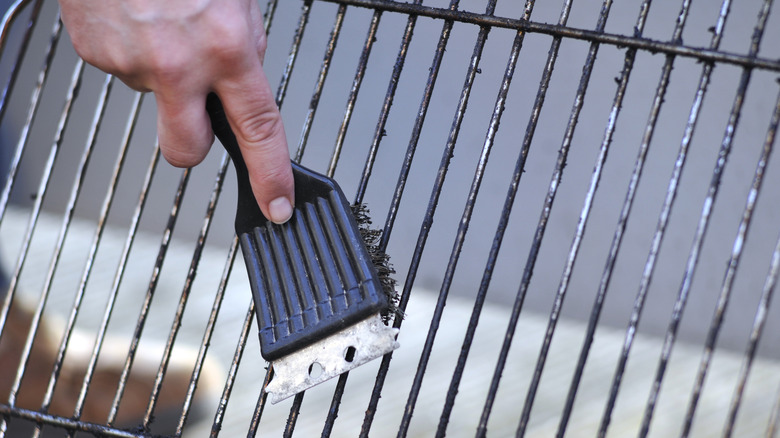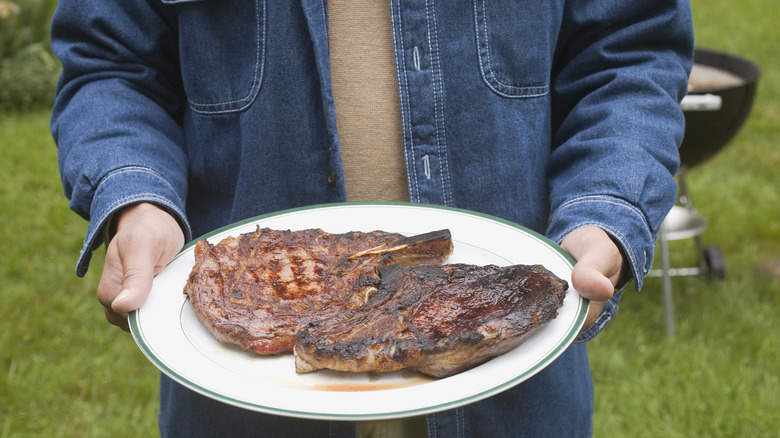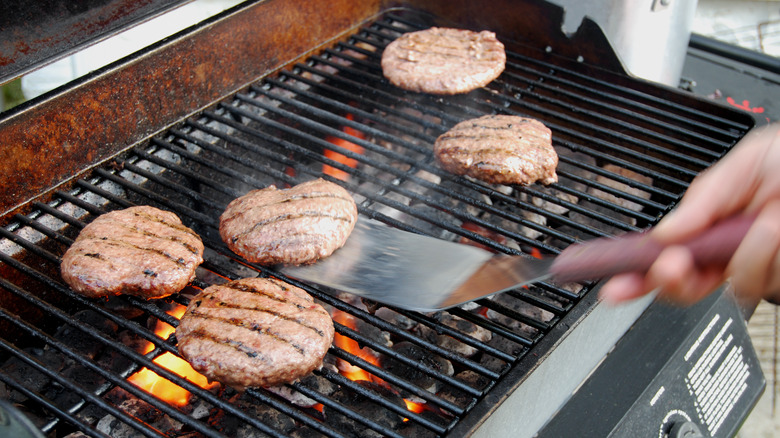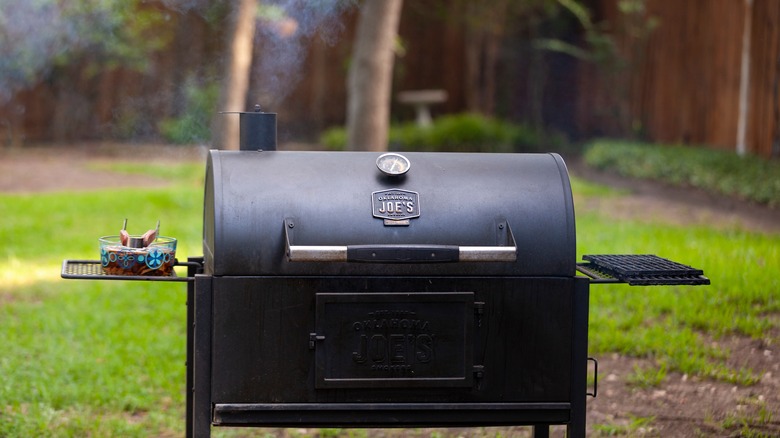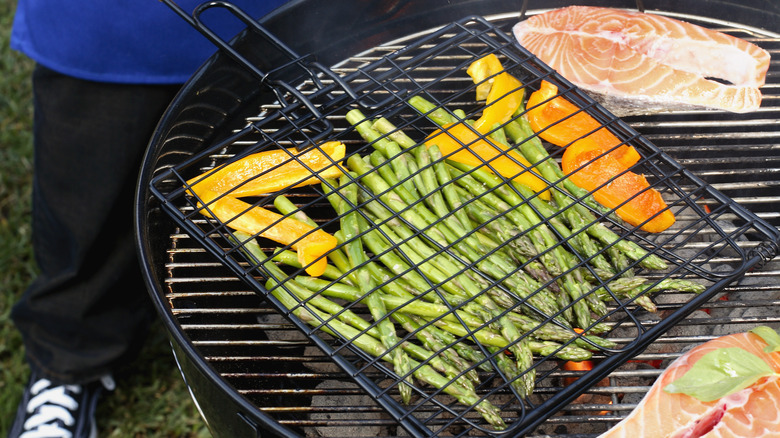Expert Tips On Winning Grilling Season
It's summer, and that means it's grilling season. Looking to upgrade your grill game and blow your loved ones' minds? We have some helpful tips that will take your steaks, shrimp, burgers and veggies to the next level. Even savvy grill masters can benefit from them: Grilling is an eternally complex process, and new techniques are always being pioneered. What tools should be used? Should the grill lid be closed or open? What are the best marinades? These are the questions that matter when it comes to grilling. To truly win grilling season, you need to have your answers ready.
To that end, we've reached out to a couple of culinary geniuses and asked them to share their insights on what works best when it comes to your grill. We've also asked what mistakes you may wish to avoid if you want to serve up food that really rocks. Join us as we explore these expert tips on how to absolutely ace summer grilling this year.
Turn up the heat
According to Daniel Meursing, CEO of Premier Staff in Hollywood, being shy about turning up the heat on the grill is one surefire way people get the art of grilling wrong. "One of the most common mistakes I see novice grillers make is being afraid of high heat," he tells us. "They'll timidly place their steaks or burgers on a lukewarm grill, hoping for the best. But if you want that restaurant-quality sear, you need to embrace the power of high heat."
Of course, you'll want to know what you're doing before cranking the heat up, as doing so safely is of the utmost importance. Once you learn how it's done, however, you'll be met with meat that features a perfect crust and juicy interior. "I learned this lesson firsthand when we were staffing a private event for Will Smith's family," Meursing states. "The chef was a true grill master, and he showed me how to properly preheat the grill until it was scorching hot before adding the meat. The result? Steaks with a perfect caramelized crust and a juicy, tender interior. From that day forward, I've never been afraid to crank up the heat when grilling."
As far as temperature goes, know that steaks typically require about 450 to 500 degrees Fahrenheit for a good sear, while burgers may only require 375 to 400 degrees Fahrenheit. Of course, the thickness of the meat will also make a difference, so bear that in mind when grilling over high heat.
Or opt to go low and slow
Anyone approaching a grill shouldn't be afraid of high heat. But depending on the meat, high heat may not be the best option. In these cases, cooking at a lower temperature for longer periods of time works best. As Daniel Meursing explains, "There are times when low and slow is the way to go. This is especially true when you're working with tougher cuts of meat, like brisket or pork shoulder, that benefit from a long, slow cook to break down the connective tissue and infuse them with smoky flavor."
As an event staffer, Meursing has had ample opportunity to witness the benefits of low and slow cooking. He tells us of a time he staffed a Stanford University alumni event that featured caterers who employed massive smokers to cook whole pigs. By cooking the pigs overnight at a low and slow temperature, they ended up yielding incredibly scrumptious meat that was well worth the wait. "The aroma was intoxicating, and the meat was so tender it practically melted in your mouth. That experience taught me the value of patience and the incredible flavor that can be achieved through slow, indirect cooking."
Avoid using cold meat
When it comes to using cold meat on the grill, Daniel Meursing likens the process to the business world. "You wouldn't walk into a client meeting without doing your research and preparing your talking points, right? The same principle applies to grilling." Instead of using cold meat straight out of the fridge, Meursing recommends you take it out ahead of time to allow it to come to room temperature. Apparently, this is a tried-and-true technique he learned from a chef while working at a fashion event on Rodeo Drive. "He explained that allowing the meat to come to room temperature helps it cook more evenly and prevents it from seizing up on the hot grill," Meursing tells us. "Ever since then, I've made it a rule to take my meats out of the fridge at least 30 minutes before grilling."
There is one caveat to this, and it regards cooking burgers. There's a camp of people out there who rally around the idea of chilling burger patties before cooking them for excellent results. Whether or not that is true, we will leave to you to decide –- otherwise, grilling meat that's been brought to room temperature is the way to go.
Embrace the power of a good marinade
According to a couple of our experts, marinating your meat before grilling it is a must. This process introduces flavors that make the meat more exciting, and also helps tenderize the meat. The most toothsome juiciness is often the result of using marinades with acids and oils, which cause the meat to become oh-so-delectable and succulently savory. "Marinades are like the secret weapon of grilling, " Daniel Meursing explains. "They can transform even the most basic cuts of meat into something extraordinary."
Meursing says it can often take up to 24 hours to get the full benefits of a marinade, especially when dealing with tougher cuts. But Rena Awada of Healthy Fitness Meals tells us you may be able to get away with even less time if needed, noting, "Marinating your meat before grilling can add so much flavor and moisture to your meats even if it is just 30 minutes!"
When it comes to what kind of marinade to use, the sky's the limit. Feel free to experiment with a mixture of flavors; soy sauce, honey, garlic, and ginger serve as an awesome starting foundation. Some may also love a southwestern-style marinade, a Cajun approach, Hawaiian flavors, or something else entirely. Take the time to experiment with different elements, to discover your favorite blend. Also, know that if the marinade includes an acid like lemon or vinegar, you should only marinate any chicken for 24 hours or less. Otherwise, you run the risk of ruining your meat.
Using a meat thermometer is key
This one might seem a bit unnecessary. Really, who needs another cooking doohickey? But trust us, this purchase is worth it: You should absolutely own a meat thermometer. As anyone who has ever owned one will likely tell you, it's very helpful when cooking meat, especially on the grill. As Rena Awada explains, "Once you get yourself a food thermometer and get into the habit of using one, it will become your best friend ... using a meat thermometer will ensure that your food is cooked thoroughly, preventing overcooking or undercooking."
By using a meat thermometer, you ensure the meat is not only safe, but also palatable: They save you from accidentally drying your meat out. Daniel Meursing recalls a time when the meat thermometer proved to be a lifesaver at a big Hollywood event. "I learned the importance of temperature control when we were staffing the Emmy Awards' afterparty," he explains. "The caterer was grilling hundreds of chicken breasts, and he used a thermometer to ensure that each one was cooked to a safe internal temperature without drying out. That experience taught me that eyeballing doneness is a recipe for disaster. A good thermometer takes the guesswork out of grilling and ensures consistently delicious results."
Don't forget to preheat
If you've ever considered skipping the preheating process when it comes to using your grill, don't. "One common mistake people make when they grill is they do not preheat their grill or wait until it is preheated to its optimal temperature," explains Rena Awada. "I suggest that you make sure your grill is properly preheated before grilling." While it can undoubtedly be tempting to skip the preheating process, doing so may render unexpected consequences, ranging from improperly cooked meat to disappointing flavor. Preheating your grill is also a great way to create those beautiful grill marks we all want to see streaking across our food. This happens as the sugar in your food begins to caramelize.
For the best results, try preheating your grill at least 10 to 15 minutes ahead of time. "Your food will cook evenly, and it will help prevent it from sticking to the grates," Awada details. When preheating a gas grill, simply open the lid, turn it on, and light the fire. Once you've completed these steps, the only thing that's left to do is to close the lid and wait. These additional steps may seem like a pain, but in the end, the color payoff and perfectly-cooked results will make it all worth it.
Clean and oil the grates
Cleaning and oiling grill grates ahead of time does wonders for keeping your food stick-free. "Unless your grill is brand new, it will have some sort of residue from previous use," states Rena Awada. "I recommend you clean the grates of the grill thoroughly using a grill brush and oiling it with a high smoke point oil like grapeseed oil before use." As mentioned previously, preheating your grill can also assist in keeping food from sticking to your grates. But once the grates get dirty, as they inevitably will, they should be cleaned relatively quickly.
Some people resort to a quick brushing right before their next grilling adventure. Others choose to go the extra mile by removing the grates and soaking them in baking soda and vinegar. This gives the grates a deeper clean and works well for stubbornly stuck food that won't come off with a grill brush alone. If you aren't sure which oils have high smoke points aside from the aforementioned grapeseed variety, know that canola and avocado oil tend to do well. Using oils with higher smoke points prevents out-of-control smoke and ensures your meat will taste its best; using oils that don't quite lend themselves to high heat often results in unpleasant flavor.
Give it a break
You've just pulled a hot and juicy steak off the grill and can't wait to dig in. We know the feeling. Still, it would behoove you to allow the meat to rest before chowing down. Why? Experts reveal that allowing your meat to rest is one of the best ways to ensure a moist and delicious meal. "After grilling, transfer the meat to a plate or cutting board and allow it to rest for a few minutes before slicing or serving. This allows the juices to redistribute, and you will get juicer meat every time," explains Rena Awada.
With this in mind, you may be wondering exactly how long you'll need to allow the meat to take a breather. That, we're afraid, is up for debate. While some may say 5-10 minutes will do, others, like Martha Stewart, insist that meat should rest for at least half of the amount of time it took to cook. Ouch. No matter which way you slice it, the experts agree that resting your meat before cutting into it is key to achieving the juicily grilled delights you desire.
Resist the flip
As food grills and time passes, it's tempting to stand idly by your grill and flip your meat every few seconds. But this should be avoided. Though it might seem like second nature to flip your food multiple times, according to Rena Awada, doing so may prove disastrous. " We naturally want to keep flipping that meat; resist the urge!" she states. "Allow it to cook thoroughly on each side without flipping it so many times."
What's so bad about flipping your meat multiple times? As Awada points out, doing so can render the meat uncooked on the inside. Moreover, it may lead to a tougher piece of meat, with less of that perfect sear to boot. Rather than standing around flipping the meat, it may be better to distract yourself by doing other things, like preparing your ideal barbecue side dishes or having a small chat with a friend. Just be sure not to forget about your meat entirely; that, of course, would yield an entirely different issue.
Close the lid
Rena Awada has a few tips for making sure grilled meat gets cooked through, and one may seem a bit counterintuitive. She tells us that keeping the lid of the grill closed can work wonders when it comes to maintaining a consistent temperature. Instead of constantly opening the grill to check the meat, simply keep the grill cover closed for as long as possible to allow the temperature to stay high. This ensures your meat, especially thicker cuts, cooks all the way through.
It makes sense if you think about it. When opening the lid of the grill, the heat naturally dissipates, making the internal temperature of your grill inconsistent. By keeping the cover closed, you maintain a nice, high heat. This also works well for chefs trying to avoid too-frequent flipping; closing the cover can serve as a visual reminder to remain hands-off and allow the meat to take on a good sear. Still, it's important to note that for thinner cuts, you may wish to leave the grill open. Though consistent heat is helpful here too, it may not be as necessary, as thin pieces of meat tend to cook a lot faster than denser pieces.
Use a grill basket
Grilling vegetables or tiny pieces of meat? "A grill basket or grill pan is highly recommended for grilling veggies and other delicate items like shrimp or fish. This will prevent your food from falling through the grates," explains Rena Awada.
In case you aren't familiar, a grill basket is a simple basket you can place small food items in. The slits in the basket are fewer, smaller, and more densely criss-crossed than a typical grill grate's, making it difficult for the food to fall through. Depending on what you're grilling, you can expect certain food items in your grill basket to grill in next to no time — or for a very long time. Grilling carrots, for example, may take as long as 45 minutes, while onions or mushrooms may take a lot less time. As always, check your food for doneness when appropriate, but try to keep from checking too often, as this will affect your grill's ability to maintain a consistent temperature.
Also, don't be afraid to experiment with flavors when it comes to your grill basket food. Veggies and other food items can often benefit from marinades and seasonings just like meat does, and the smoky flavor imparted by the grill will only work to enhance their overall taste.
